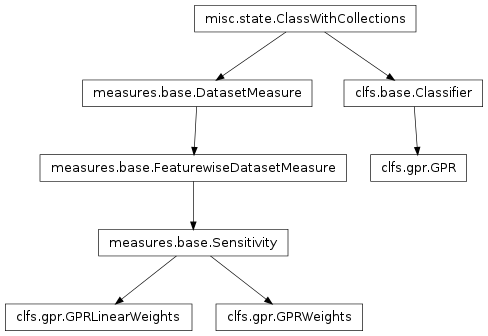This content refers to the previous stable release of PyMVPA.
Please visit
www.pymvpa.org for the most
recent version of PyMVPA and its documentation.
clfs.gpr
Module: clfs.gpr
Inheritance diagram for mvpa.clfs.gpr:

Gaussian Process Regression (GPR).
Classes
-
class mvpa.clfs.gpr.GPR(kernel=None, **kwargs)
Bases: mvpa.clfs.base.Classifier
Gaussian Process Regression (GPR).
Note
Available state variables:
- feature_ids: Feature IDS which were used for the actual training.
- log_marginal_likelihood: Log Marginal Likelihood
- log_marginal_likelihood_gradient: Log Marginal Likelihood Gradient
- predicted_variances: Variance per each predicted value
- predicting_time+: Time (in seconds) which took classifier to predict
- predictions+: Most recent set of predictions
- trained_dataset: The dataset it has been trained on
- trained_labels+: Set of unique labels it has been trained on
- trained_nsamples+: Number of samples it has been trained on
- training_confusion: Confusion matrix of learning performance
- training_time+: Time (in seconds) which took classifier to train
- values+: Internal classifier values the most recent predictions are based on
(States enabled by default are listed with +)
See also
Please refer to the documentation of the base class for more information:
Classifier
Initialize a GPR regression analysis.
| Parameters: |
- kernel (Kernel) – a kernel object defining the covariance between instances.
(Defaults to KernelSquaredExponential if None in arguments)
- sigma_noise – the standard deviation of the gaussian noise. (Default: 0.001)
- lm – The regularization term lambda. Increase this when the kernel matrix
is not positive, definite. (Default: 0.0)
- regression – Either to use ‘regression’ as regression. By default any Classifier-
derived class serves as a classifier, so regression does binary
classification. (Default: False)
- retrainable – Either to enable retraining for ‘retrainable’ classifier. (Default:
False)
- enable_states (None or list of basestring) – Names of the state variables which should be enabled additionally
to default ones
- disable_states (None or list of basestring) – Names of the state variables which should be disabled
|
|---|
-
compute_gradient_log_marginal_likelihood()
Compute gradient of the log marginal likelihood. This
version use a more compact formula provided by Williams and
Rasmussen book.
-
compute_gradient_log_marginal_likelihood_logscale()
Compute gradient of the log marginal likelihood when
hyperparameters are in logscale. This version use a more
compact formula provided by Williams and Rasmussen book.
-
compute_log_marginal_likelihood()
Compute log marginal likelihood using self.train_fv and self.labels.
-
getSensitivityAnalyzer(flavor='auto', **kwargs)
Returns a sensitivity analyzer for GPR.
| Parameters: | flavor (basestring) – What sensitivity to provide. Valid values are
‘linear’, ‘model_select’, ‘auto’.
In case of ‘auto’ selects ‘linear’ for linear kernel
and ‘model_select’ for the rest. ‘linear’ corresponds to
GPRLinearWeights and ‘model_select’ to GRPWeights |
|---|
-
kernel
-
set_hyperparameters(hyperparameter)
Set hyperparameters’ values.
Note that ‘hyperparameter’ is a sequence so the order of its
values is important. First value must be sigma_noise, then
other kernel’s hyperparameters values follow in the exact
order the kernel expect them to be.
-
untrain()
-
class mvpa.clfs.gpr.GPRLinearWeights(clf, force_training=True, **kwargs)
Bases: mvpa.measures.base.Sensitivity
SensitivityAnalyzer that reports the weights GPR trained
on a given Dataset.
In case of KernelLinear compute explicitly the coefficients
of the linear regression, together with their variances (if
requested).
Note that the intercept is not computed.
Note
Available state variables:
- base_sensitivities: Stores basic sensitivities if the sensitivity relies on combining multiple ones
- null_prob+: State variable
- null_t: State variable
- raw_results: Computed results before applying any transformation algorithm
- variances: Variances of the weights (for KernelLinear)
(States enabled by default are listed with +)
See also
Please refer to the documentation of the base class for more information:
Sensitivity
Initialize the analyzer with the classifier it shall use.
| Parameters: |
- clf (Classifier) – classifier to use.
- force_training (Bool) – if classifier was already trained – do not retrain
- enable_states (None or list of basestring) – Names of the state variables which should be enabled additionally
to default ones
- disable_states (None or list of basestring) – Names of the state variables which should be disabled
- combiner (Functor) – The combiner is only applied if the computed featurewise dataset
measure is more than one-dimensional. This is different from a
transformer, which is always applied. By default, the sum of
absolute values along the second axis is computed.
- transformer (Functor) – This functor is called in __call__() to perform a final
processing step on the to be returned dataset measure. If None,
nothing is called
- null_dist (instance of distribution estimator) – The estimated distribution is used to assign a probability for a
certain value of the computed measure.
|
|---|

